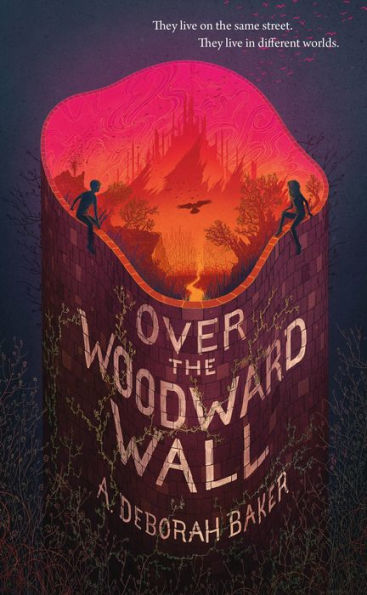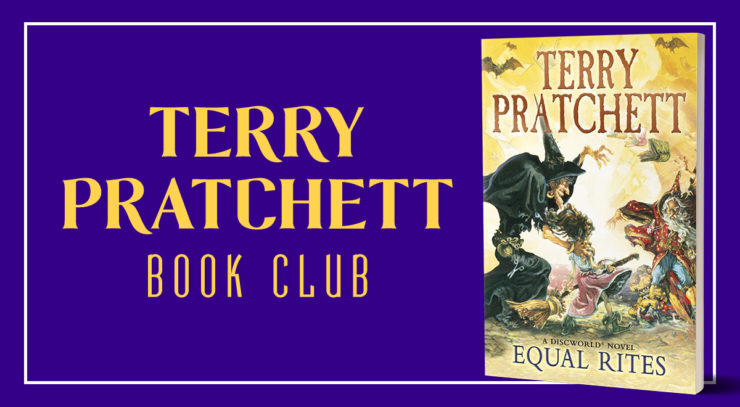It’s time to hang out in front of the gates for a wizard to show up! You know, they’re never late or early, and so on. Time to continue on our journey for Equal Rites.
Summary
Esk wakes to find Granny there, who’s wrapped her in a blanket—her dream came partly real and she burned down a section of forest, so Granny insists that they get to the university right away. They get on the broomstick, but dawn is coming and it won’t fly in sunlight, so Esk uses her magic to get the broom to catch the night before day can break over them. The ride is terrifying, but they make it to Ankh-Morpork and get set up at a place called The Shades. Granny is in instant demand as the city doesn’t have many witches, and she’s finding that she enjoys the atmosphere. She sends letters to the University that go unanswered. They go to the gates and can’t get in until Treatle shows up and offers to take Esk in himself. He takes her to the hall where the initiates are presented and show Simon off to them, who does an impressive bit of magic using words he made up. Esk asks one of the important wizards there if she can be a wizard and gets laughed at for her trouble.
Buy the Book


Over the Woodward Wall
Granny gets in through the ordinary back door, finding marks from other witches indicating that the housekeeper, Mrs. Whitlow, is friendly to people like them. She asks Granny to read her tealeaves, while Granny tries to Borrow the mind of a nearby animal to check on Esk, and ends up finding that the University has a mind of sorts that she can Borrow instead. She tells Mrs. Whitlow a fortune she’ll like and also adds that she should hire a young girl who will come by in the future, then makes her way outside as Esk rushes out the front gates in tears—she couldn’t do magic in front of them and the wizards laughed at her. Granny tells her it’s not the end of the world, and that she can get into the University the witch’s way, by working as a maid. Esk takes the job and is thoroughly bored sweeping and cleaning up after wizards. She does catch a lecture of Simon’s (who is terrible at public speaking) about how the world only exists because people keep imagining it. His talk seems to attract creatures from the Dungeon Dimensions, but only Esk appears to notice this.
Granny comes by to check on Esk, but she’s a bit caught up in being a city witch for the time being. Esk realizes that she needs to learn to read if she’s going to become a wizard and suggests to Mrs. Whitlow that she be allowed to clean the library even though the staff never do so. When she’s there, she runs into Simon, who is worried about her getting into trouble. More creatures show up in the library, the books reaching a critical magic mass, and Esk’s staff hits Simon on the head, knocking him out cold. Simon won’t wake up, so Esk brings Granny in to help, telling her that she threw the staff in the river because it tried to kill Simon. Granny tells her that the staff was trying to protect her because the creatures she keeps seeing are being summoned by Simon. Esk is so angry at the suggestion that Simon could do such a thing that she almost calls Granny a name, and the witch slaps her.
Granny explains the Dungeon Dimensions to Esk and how they hijack clever minds to try and break into their world. They both know that Simon has been taken by those creatures, so Granny wants to talk to the wizard in charge, and demands to go to the Great Hall—where women aren’t allowed. The various wizards and trainees and porters try to head them off, but Granny makes it to the head table and gets into a duel with Cutangle, the Archchancellor, bringing about more creatures from the Dungeon Dimensions. Granny has warned Esk about Simon potentially coming back from that place wrong, that something could get into him, so she goes to head it off, but the door to his room won’t open. Esk Borrows the building’s mind to unlock the door, walks into the room, and disappears into light. When the whole thing ends, the students find Simon still in bed with Esk unconscious on the floor beside him.
Book Club Chat
This is mostly an action section where a lot of fun stuff happens, but I must give my brief thanks for Granny’s taking to city witch life and the splash of color she slowly adds to her wardrobe, which has Esk so scandalized. (Deep red wine lining a cloak, that’s top tier.) Just, everything about Granny’s transformation in this section is excellent, and I love the fact that she’s utterly suspicious of these locales at the start, only to find that being in a truly sizable urban area is good fun for someone with her skillset.
One thing that keeps coming up for me in this book—I find myself wondering if the whole story shouldn’t have taken place over a longer span of time. The majority of this is occurring when Esk is eight and nine years old, but as the story goes on, she’s learning more and growing up more. And while there’s nothing about the story that screams “she needs to be a teenager”, there are moments where I find myself forgetting that she’s supposed to be younger? I’m trying to remember myself at nine and thinking how I would have measured up alongside. The no-nonsense self-assuredness is really the main thing about Esk that helps her register as younger, since teenagers aren’t generally too solid on self-esteem and assuredness.
We start to get into magical philosophy with Simon and his ideas around magic and how generally impressive he’s considered to be. And yet again, Pratchett basically makes magic the Disc’s version of science: Simon is impressive because he is creating new worlds, categorizing and explaining magic in ways that are concise but unheard of. It’s the sort of thing people say about great scientific and mathematical minds in our world, this idea that we could understand everything if only someone could figure out how to break it down for us. Of course, like many great scientific minds, Simon is having his ideas hijacked by figures that want to do harm (though they are literally monsters in this case rather than opportunistic corporations or governments).
According to Pratchett, the duel between Granny and Cutangle is a sort of homage to the British folk song “The Two Magicians”, which is fascinating for the actual content of the song: It’s about a blacksmith who is threatening to take a maiden’s virginity, which results in a transformation sequence where the maiden keeps turning into animals and the blacksmith catches her as different animals. The maiden doesn’t get away in every version of the song, and though the context was likely meant to be a teasing, jaunty sort of tune… it’s still ultimately a song about a guy who refuses to respect a woman’s consent and therefore is intent on raping her. Which. I mean, that’s one way to talk about sexism in your book about men and women’s magic.
As metaphors go, it’s not what you’d call subtle, but it is layered as hell—after all, Granny and Cutangle are not engaging in anything remotely sexual during this fight, but there’s something to be said for couching this fight for dominance in a story that brings that idea to the table regardless. Essentially, we’re being reminded that consent is a major component to the inequality that women are forced to reckon with on a daily basis because this framing device is deliberately highlighting the fact. It makes a great action sequence that much more distinct, and deeply unsettling.
Asides and little thoughts:
- Broom starts like an old car. So good.
- According to Granny, reading books by dead people is basically necromancy, which is honestly how we should all think about reading books by dead people because it’s just much cooler that way. You are currently practicing necromancy right now. *waves to Sir Terry in the beyond*
- Treatle says the Unseen University is “a lot bigger inside than out, like an iceberg”, but my brain goes TARDIS and that’s where it stays.
Pratchettisms:
“Foolish child. All you could tell was that he thought he was telling the truth. The world isn’t always as people see it.”
The gates were indeed big and black and looked as if they were made out of solid darkness.
The room inside was pink and frilly. There were frills on things that no one in their right mind would frill. It was like being inside candyfloss.
It is well known that stone can think, because the whole of electronics is based on that fact, but in some universes men spend ages looking for other intelligences in the sky without once looking under their feet.
The light was misty and actinic, the sort of light to make Steven Spielberg reach for his copyright lawyer.
Next week we’ll finish up the book! See you then!










